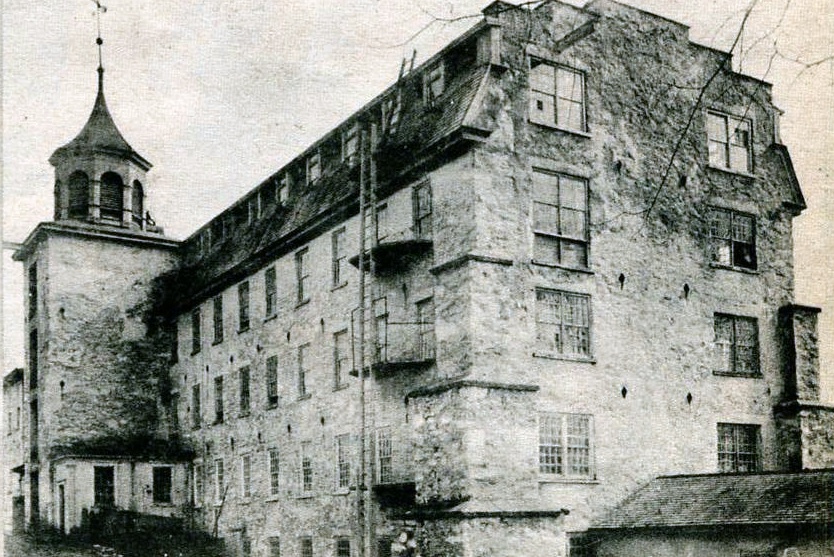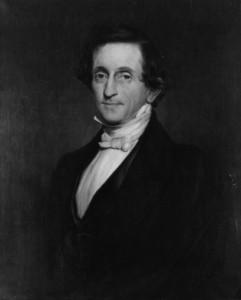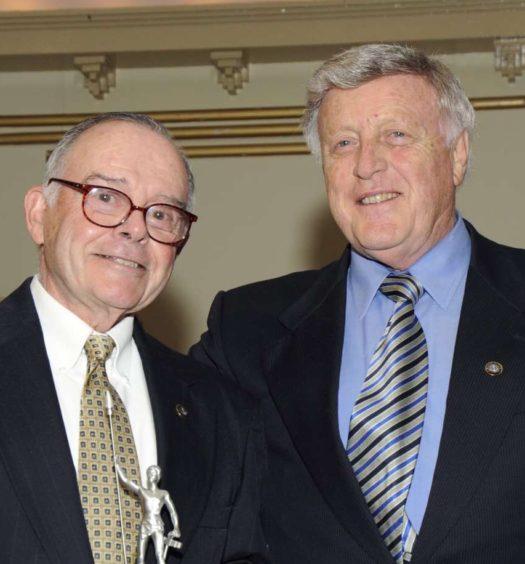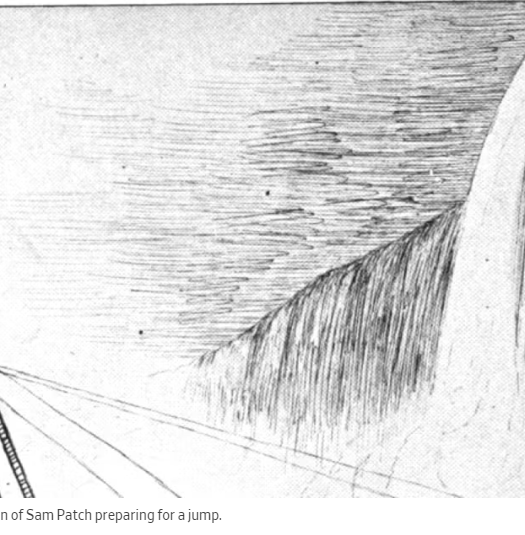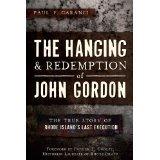Zachariah Allen was born to Zachariah and Anne (Crawford) Allen in Providence on September 15, 1795. While little is known of his early years, it is evident by eighteenth century writings that Allen’s childhood was shaped by two tragic events: the pageant of George Washington’s funeral and the funeral of his own father that took place in April, 1801, when Zachariah was but five years old. He received his education at Phillips Exeter Academy in New Hampshire and graduated from Brown University in 1813. Although he studied law, medicine and religion, he chose the law as a profession and was admitted to the Rhode Island bar in 1815. He undertook a practice in Providence in the office of the late Senator James Burrill and married Eliza Harriet Arnold two years later. It was said that he had both taste and ability for legal discussions and the discrimination required for a successful practice. For a considerable time, in fact, he seemed wedded to the profession. But he grew to dislike the practice of law and turned his attention instead to his family’s business, manufacturing.
Although deprived of the opportunity to benefit from the genius, enterprise, energy and executive ability of his father, young Zachariah carried his father’s genes. While engaged in the manufacturing industry his creativity began to show. In 1821 he constructed the first hot-air furnace for the heating of homes and in 1833 he patented his best-known device, the automatic cut-off valve for steam engines. But it was in 1822 that Allen would start a project that would leave an indelible imprint on the young Town of North Providence, as well as on the entire country.
In that year, Zachariah Allen built a woolen mill on Old River Road (now Woonasquatucket Avenue) along the Woonasquatucket River. In the early days of manufacturing, many a mill was lost to fire, and the lives of some workers were lost, but Allen built his mill with various fire safety devices that were advanced for the time. The Allendale Mill included stone construction, a sprinkler system, heavy fire doors, a hydrant, a rotary fire pump, and copper-riveted fire hose, the first to be used in American textile mills. In addition, Allen built a heavy firewall separating the picker room, an area filled with highly flammable cotton fibers, from the rest of the mill. Finally, he roofed the structure with slate roof shingles set in mortar.
Having incorporated all of these fire protection devices, Allen promptly applied for a reduction in his fire insurance premium but was just as quickly turned down. The insurance industry of the early nineteenth century, much as is the case today, depended on the premiums paid by those considered to be good risks to subsidize those considered poor risks. There was no consideration of loss experience or potential in their determination of premiums.
Allen was not about to take no for an answer as he felt it unfair to impose a socialistic approach to the establishment of insurance premiums. He enlisted the support of other like-minded mill owners in the area to establish a company that would provide insurance to only those manufacturing facilities of the finest construction and the highest degree of maintenance and quality. In 1835, the Manufacturer’s Mutual Insurance Company was formed and evaluated each loss with an eye toward reducing future loss potential.
Manufacturer’s Mutual Insurance Company lacked sufficient funds to fully insure large companies. So in 1848 Allen established a second company, the Rhode Island Mutual Fire Insurance Company, and two years later convinced a group of Boston manufactures to organize The Boston Mutual Insurance Company. Each of these companies followed the principles set forth by Manufacturer’s Mutual. Eventually, all three of these companies evolved into the Associated Factory Mutual Insurance Companies, also known as Factory Mutuals. Later known as the Allendale Insurance Company, it operates to this day as FM Global, an international company headquartered in Johnston, Rhode Island.
Turnpikes began in Rhode Island in the 1790s and over a dozen such roads connected Providence to the villages extending to the north and west. Allen had enough foresight to build his mills along the turnpike making it easy to receive deliveries of raw materials, goods, and supplies needed in the manufacturing process. Yet the turnpikes did not make transportation any easier for the mill workers who were unable to travel great distances to get to work. A successful mill operation therefore required a village to support the workers. To that end, Allen built a mill store, located directly in front of his mill in North Providence. The first-floor store sold sundries needed by workers. The second-floor apartment was leased to the family of James Halsey Angell, the mill’s accountant. It was here that Frank C. Angell, one of the most prominent turn of the century Centredale residents, was born. The elder Allen also constructed several mill houses, as well as a meeting hall that was used both for community meetings and church services. The original plan to locate a library in the basement of that building was abandoned. This Church also survives to this day and is called the Allendale Baptist Church.
Allen became prominent in the community and served as a member of the Providence Town Council. He helped introduce fire engines to Providence and organized a committee to establish a free library and natural history museum. For all his achievements and successes, however, Allen became a victim of the Panic of 1857, which was a sudden downturn in the U.S. economy. Forced to file for bankruptcy, he continued working in the manufacturing industry by helping manage the Georgia Mills that his brother owned and by helping his son-in-law, William Ely, with the Allendale Mills that Ely had purchased from him.
Zachariah Allen’s many accomplishments helped shape Providence and North Providence and had a substantial impact on the state and the nation. But his prominent family also changed Rhode Island forever. Crawford Allen (1798-1872) was a partner in Philip Allen & Sons, the predecessor to Allen Print Works, from 1830-1870. He was also a cotton broker operating as Crawford Allen & Co. Philip Allen (1785-1865). Zachariah’s older brother Philip served Rhode Island as governor (1851–1853) and later as a United States senator (1853–1859). Zachariah’s sister, Lydia, married Sullivan Dorr. Their son, Thomas Wilson Dorr, in response to the inequities of suffrage that denied a vote to any male who did not own property, led a rebellion which eventually resulted in his establishing an alternate state government. Dorr was elected its governor in 1842 but was soon forced into exile, after which we was captured, convicted of treason, and imprisoned in 1844. The cause for which he ultimately died led to state constitutional changes that allowed all men to vote regardless of property ownership status (the women’s suffrage movement had not yet become active.)
On the night of March 17, 1882, Zachariah Allen attended the Stoddard lecture at Infantry Hall in Providence. He felt so good afterward that he declined a ride home, preferring instead to walk the more than two miles. Once home, he sat at the table with his daughter. It was 11:00 p.m. While engaged in conversation he put his head in his hands and died suddenly without a struggle. He was in his 87th year.
Allen’s family home at 1093 Smith Street in Providence (formerly part of North Providence) still stands today. It is privately owned and was added to the National Register of Historic Places on September 15, 1994.
(Banner Image: Allendale Worsted Mill in North Providence, circa 1880s. Some fire protection features can be seen from this exterior view: stone exterior, slate roof, and ladders as fire escapes. (Rhode Island State Archive))
For further reading:
Caranci, Paul F. North Providence: A History and the People Who Shaped It. Charleston, SC: The History Press, 2012.
Amos, Perry. Memorial of Zachariah Allen 1795-1882. Cambridge, MA: John Wilson and Son University Press, 1883.
Zachariah Allen Papers, Textile Manufacturer, Providence, RI Papers, 1767-1946, MSS 254, Rhode Island Historical Society.

